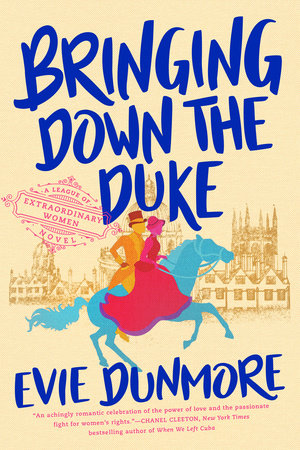READERS GUIDE
Bringing Down the Duke
Evie Dunmore
Discussion Questions 1. What obstacles do you think Annabelle and Sebastian will face now that they have finally chosen to be together, considering the opposition their union will encounter in their social circles? How do you envision their first year of marriage?
2. At Lady Lingham’s Christmas dinner, Annabelle contemplates how experiencing passion has ruined her for otherwise perfectly eligible men. Is this something you can relate to? How important is passion in a romantic relationship?
3. There are several examples throughout history of British aristocrats who went against protocol and married their commoner mistress, a courtesan, or their favourite actress. Why do you think Sebastian chose Annabelle over his life’s work? What consequences do you think he will face?
4. Why do you think Annabelle rejected the position of Sebastian’s mistress even though it would have given her the safety net she badly needed? Do you agree or disagree with her choices?
5. When debating the trade-off between freedom and security with Sebastian, Annabelle quotes John Stuart Mill, who says “It is better to be a human being dissatisfied than a pig satisfied; better to be Socrates dissatisfied than a fool satisfied.” What do you think this means? Do you agree or disagree?
6. Annabelle and Sebastian navigate complicated gender and power dynamics as they build their relationship. How would you describe these? How do you think their relationship compares to modern standards?
7. The University of Oxford is an integral part of the book. Why do you think the author chose to set the story there? How does the academic setting impact the story? What does Oxford represent to you?
8. What do you think were the main arguments and worries against women receiving a higher education? How do you see these arguments played out in the book?
9. It is important to Annabelle that she continue her education, even after she marries Sebastian. Is education important to you? Why do you think Annabelle is so determined to receive her Oxford degree?
10. It took British women and their male allies nearly seventy years to achieve the right for women to vote in Parliamentary elections or to run for the office of Member of Parliament. Why do you think the process was so slow? How does it compare to the women’s suffrage movement in the United States?
11. Annabelle and her friends organize protests and lobby politicians to fight for their rights. What parallels can you draw to today’s political activism? How has political activism changed since then?
12. Both Queen Victoria, the most powerful woman in Europe, and Miss Elizabeth Wordsworth, the first warden of Oxford’s first women’s college, were against female political activism and women’s suffrage. Why do you think such influential and educated women would oppose women’s rights? What connections can you draw to present-day politics?
13. In order for the National Society for Women’s Suffrage to succeed, they needed to gain the support of influential male figures in the government. What role do men play in modern feminism?

